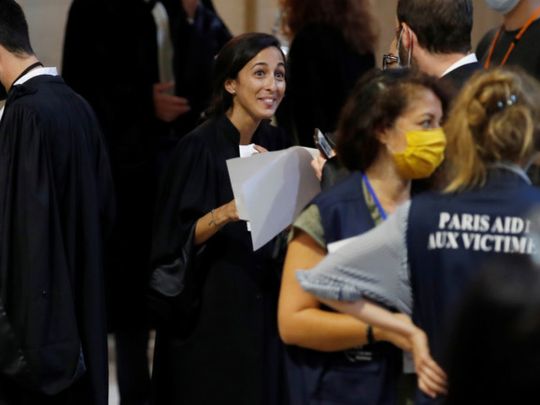
Paris: The main suspect in a terror rampage that killed 130 people across Paris described himself defiantly as “an Islamic State [Daesh] soldier” on Wednesday, upsetting some survivors who took it as a threat at the start of the trial into the 2015 attacks.
Salah Abdeslam, 31, appeared in court dressed in black and wearing a black face mask, one of 20 men accused of involvement in the gun-and-bomb attacks on six restaurants and bars, the Bataclan concert hall and a sports stadium on November 13, 2015.
Asked his profession, the French-Moroccan removed his face mask and told a Paris court: “I gave up my job to become an Islamic State soldier.” He is believed to be the only surviving member of the group that carried out the attacks. The other suspects are accused of helping to provide guns and cars or organise the attacks, which also injured hundreds and scarred the nation’s psyche.
Responsibility for the attacks was claimed by Islamic State, which had urged followers to attack France over its involvement in the fight against the militant group in Iraq and Syria.
Victor Edou, a lawyer for eight Bataclan survivors, said Abdeslam’s statement was “very violent”.
“Some of my clients are not doing too well...after hearing a statement that they took as a new, direct threat,” he said.
“It’s going to be like that for nine months.” Others said they were trying not to attach much importance to Abdeslam’s comments.
“I need more to be shocked ... I’m not afraid,” said Thierry Mallet, a Bataclan survivor.
IMPATIENT AND ANXIOUS
Before the trial, survivors and victims’ relatives had said they were impatient to hear testimony that might help them better understand what happened and why it did so.
“It is important that the victims can bear witness, can tell the perpetrators, the suspects who are on the stand, about the pain,” said Philippe Duperron, whose 30-year-old son Thomas was killed in the attacks.
“We are also awaiting anxiously because we know that as this trial takes place the pain, the events, everything will come back to the surface.” The trial is expected to last nine months, with nearly 1,800 plaintiffs and more than 300 lawyers involved in what Justice Minister Eric Dupond-Moretti called an unprecedented judicial marathon. The court’s top judge, Jean-Louis Peries, said it was a historic trial.
Eleven of the 20 defendants are already in jail pending trial and six will be tried in absentia - most of them are believed to be dead. Most face life imprisonment if convicted.
Police mounted tight security around the Palais de Justice courthouse in central Paris. Defendants appeared behind a reinforced glass partition in a purpose-built courtroom and all people must pass through several checkpoints to enter the court.
“The terrorist threat in France is high, especially at times like the attacks’ trial,” Interior Minister Gerald Darmanin told France Inter radio.
The first days of the trial are expected to be largely procedural. Victims’ testimonies are set to start on September 28.
Questioning of the accused will start in November but they are not set to be questioned about the night of the attacks and the week before them until March.
A verdict is not expected before late May, but Bataclan survivor Gaetan Honore, 40, said being there from the start mattered.
“It was important to be here on the first day, symbolically.
I’m hoping to understand, somehow, how this could happen,” he said.








